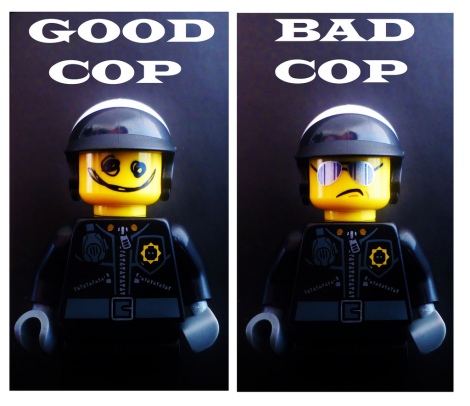Anyone who has ever been arrested will know about ‘good cop/bad cop’.
After you’ve been left to stew in your cell for a few hours you’ll be taken off to an interview room. There will be two police officers waiting. One – bad cop – will be all aggressive. Bad Cop will lean into your space; shout at you; poke their finger in your face; belittle your appearance, intelligence, beliefs; they may even make threats against you or your friends. Then they’ll back off. Maybe they’ll leave the room.
Now it is the turn of Good Cop. He or she will be friendly; apologetic for their colleague’s behaviour; they’ll ask you how you are; offer you a cup of tea; try and get you talking.
They are just two sides of the same coin. Like the characters in the Wind and the Sun they are just using different strategies to get you to do something they want you to do….in this case to confess to some wrong doing so they can get another crime solved….another case closed.
There are echoes of good cop/bad cop in the sphere of housing, care and support. There are lots of nice positive things to do….handing over the keys to a new home to someone who has spent months in temporary housing….telling someone they are about to get a new kitchen…helping to get a debt with a utility company reduced or written off. We all like being Good Cop.
But when there are more challenging situations to deal with…chasing rent arrears, confronting unacceptable behaviour or responding to domestic violence….the Good Cop often wants to pass the baton to someone else.
If I have to deal with this it will damage my relationship with the customer
It’s far easier to let someone else have the fierce conversation…to help the customer confront the truth…to deal with the tears and the anger.
There’s a great story in Malcolm Gladwell’s book ‘David and Goliath: Underdogs, Misfits and the Art of Battling Giants’. It’s about a Police initiative launched in the Brownsville district of New York by Joanne Jaffe to tackle a group of youngsters responsible for hundreds of robberies. A small team of officers focused on the hard core responsible for most of the robberies…determined to bring about change. They made contact with every individual and told them they were being given a choice.
We want to do everything we can to get you back in school, to help you get your high school diploma, to bring services to your family, find out what’s needed in the household. We will provide job opportunities, educational opportunities, medical – everything we can. We want to work with you. But the criminal conduct has to stop.
It was made clear that any further criminal behaviour would be jumped on like a ton of bricks.
Jaffe built a team of cops who loved kids; who didn’t have an ounce of negativity about them; who had the ability to connect and coach. They found out all they could about each youngster and they got to know their families and friends. At first they were rejected. Doors were slammed in their faces. But slowly they began to win back the respect of the community. A turning point came at Thanksgiving when officers clubbed together to buy a turkey for the family of one entrenched offender. They knew they’d lost him but felt there had to be hope for his six siblings.
I want you to know that as much as it seems like we’re harassing you..we really do care…we really want you to have a happy Thanksgiving.
Jaffe’s team started playing basketball with the youngsters. They helped them get jobs. They drove them to GP appointments. At Christmas toys were collected for younger kids and a meal thrown for the youngsters and their families. Jaffe would even give the youngsters a hug!
Well it worked. Crime plummeted. Robberies dropped from 400 a year before the initiative to less than 50 a year in.
It all sounds very Hollywood but we know this tough love stuff works on the rainswept streets of the UK too.
If we want to help others change their lives and take control then we need a relationship; a relationship built on trust and mutual respect. Colleagues on our Think Family service don’t mince their words; they don’t duck the difficult conversations; they hang in there and they show that they care. They even give the odd hug. Read this about the Life initiative in Swindon or this about a programme in the North West called Love Barrow Families.
Love is so often associated with being soft and fluffy; with the nice, the easy….the good times.
But love is about far more than that. It’s about being there through thick and thin; about giving a damn; about being honest and challenging; about warmth and fairness and showing you care. Love is a serious business and takes real backbone.
If we really want to help people turn their lives around then we don’t need carrots or sticks; we don’t need good cops or bad cops.
But a bit of tough love just might be the answer.


A sound and well argued proposition – however, I fear that it will be a struggle to get it over in a culture that uses “do-gooder” as a pejorative term, and in which the emphasis is on the tough, and not on the love.
LikeLike
Thanks Rob.
Well we can only do what we can do. We’re gathering people who ‘get it’ and they’ll influence others, who will influence others…….
LikeLike
Reblogged this on Not for Self, but for All and commented:
Re-blogging on my resilience site because I think this might be of interest. I like the emphasis in here on “relationships” and how public services can become part of an individual’s network. I also like that it doesn’t shy away from the fact that building relationships/networks means having to deal with the rough as well as the smooth.
LikeLike
Hi Alex
Thanks for sharing and taking the trouble to comment. We’re increasingly understanding that the relationship is all important. We are a service provider but we have to constantly guard against undermining other relationships that our customers have….with family, friends, neighbours, clubs, faith groups……If we can help someone address an issue that’s good. But if they can use their own network that’s far far better.
LikeLike
Pingback: Learning, printing, filming and being lovely | weeklyblogclub·